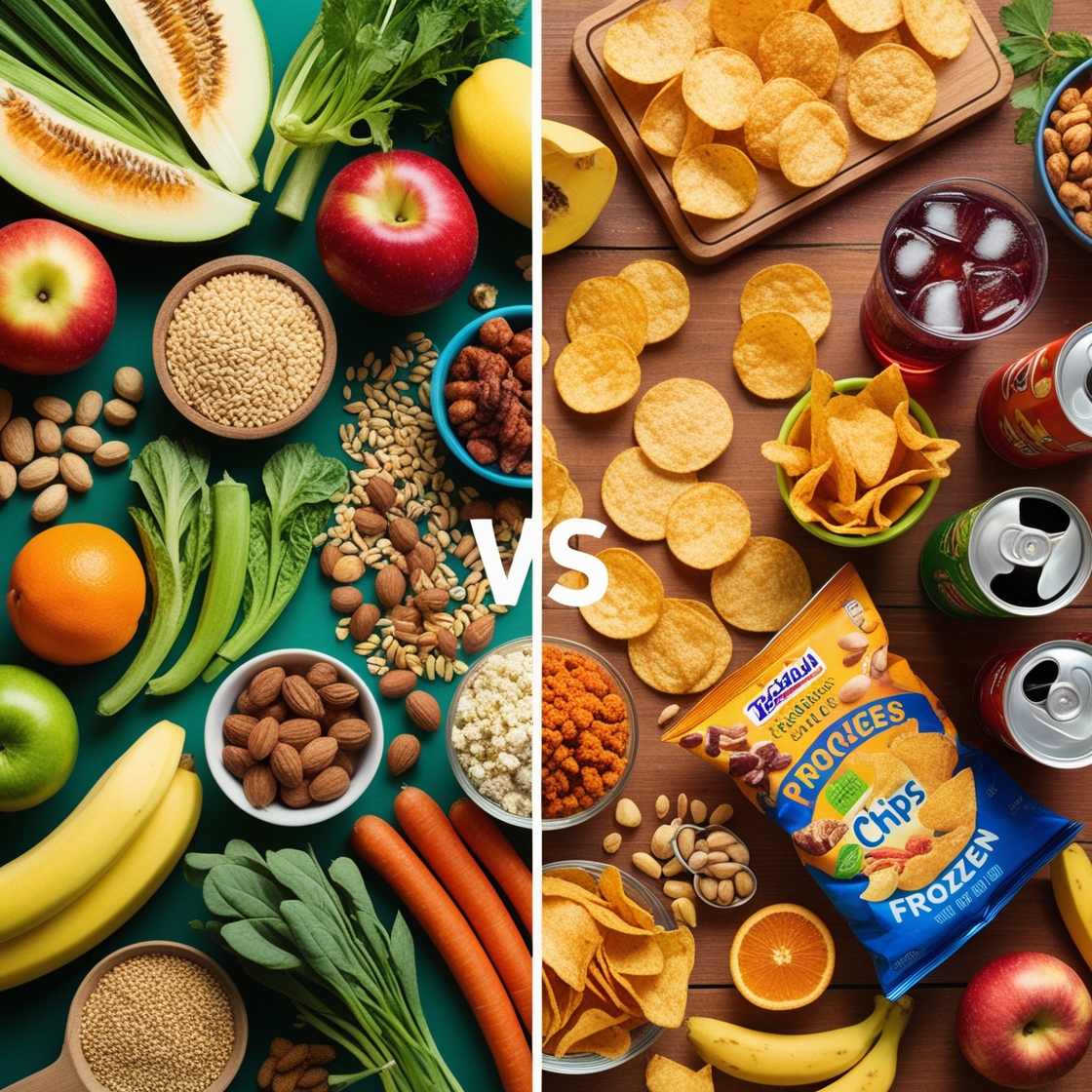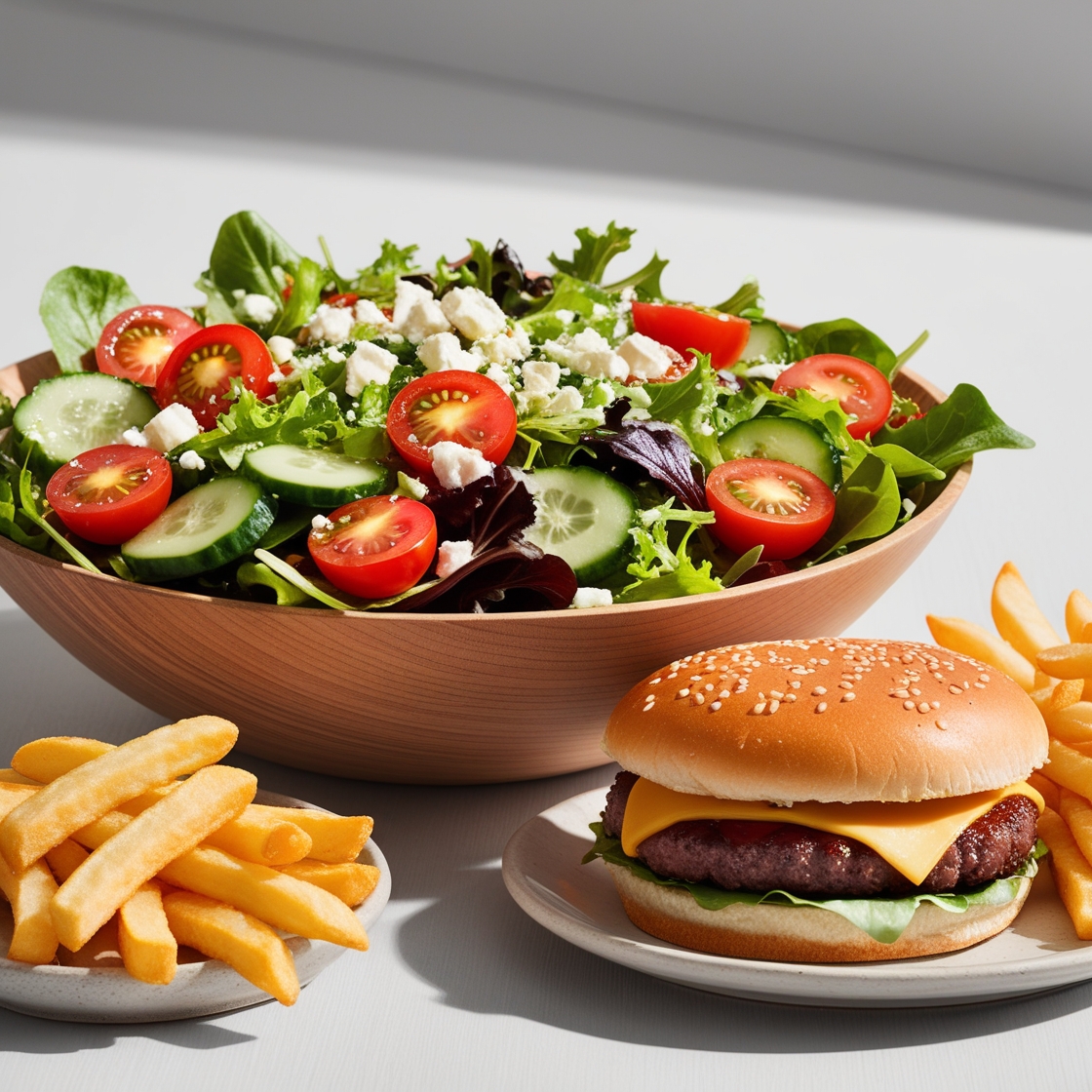Disclosure:
Thank you for reading this post, don't forget to subscribe!
Some of the links on this website are affiliate links. This means that if you click on the link and make a purchase, we may receive a small commission at no extra cost to you. Your support helps us keep the site running.Learn more on my Privacy Policy and Affiliate Disclosure page. Thank you for your support!

We live in a world bombarded by food choices. Supermarkets are stacked with items ranging from fresh produce to pre-packaged meals. But the central question remains: Are we making the best choices for our health? Understanding the difference between processed and whole foods is essential as it directly impacts our well-being.
Processed foods are those that have been altered from their natural state for convenience, shelf-life extension, or flavor enhancement. Think of your morning cereal, canned soups, or even that bag of chips you love. These foods often undergo various levels of processing, including adding preservatives, artificial ingredients, and sometimes losing valuable nutrients in the process. On the flip side, whole foods are minimally altered and remain close to their natural form. Fruits, vegetables, lean meats, and whole grains fall into this category, providing more nutritional value and less harmful additives.
Diet plays a crucial role in our overall health. A diet dominated by processed foods can lead to nutritional deficiencies, weight gain, and a higher risk of chronic illnesses like diabetes or heart disease. In contrast, a diet rich in whole foods supports better overall health, providing the necessary vitamins, minerals, and fiber our bodies need to function optimally.
It’s important to recognize the impact diet has on health. When you fill your plate with whole foods, you’re not just eating; you’re nourishing your body in the best way possible. This understanding empowers better food choices leading to improved health outcomes.
What Are Processed Foods?
Processed foods are everywhere, from quick snacks to microwave dinners. But what exactly are processed foods? They are foods that have been altered from their natural state, often for convenience, flavor, or an extended shelf life.
check out: Why Grains Are Unhealthy-The question of whether grains are truly essential or potentially harmful?
There’s a spectrum of processing, ranging from minimally processed items like bagged spinach or chopped vegetables to highly processed foods like sugary cereals and frozen pizzas. Minimally processed foods are altered just enough to make them convenient, but they retain most of their nutritional value. Moderately processed foods might include canned fish or fruit packed in syrup, where some additional ingredients are introduced. Highly processed foods, the most concerning on the health front, contain many added ingredients, artificial flavors, colors, and preservatives.
Common examples of processed foods in daily diets include breakfast cereals, cookies, chips, instant noodles, and lunch meats. These items are often packed with added sugar, salt, and unhealthy fats to make them tastier and more addictive, but they come at a cost to your health.
Processed food manufacturing involves techniques designed to enhance flavor, texture, and shelf life. This includes the use of additives, preservatives, and artificial ingredients. Additives like emulsifiers create the smooth texture in your favorite ice cream, while preservatives like sodium benzoate keep your canned goods safe for a long time. Artificial ingredients, although improving taste or appearance, often bring along potential health risks.
read next:
Nutritional Deficiency in Processed Foods
Processed foods might be convenient and tasty, but they generally fall short in providing the nutrients your body craves. One major downside of food processing is the loss of essential vitamins and minerals. During manufacturing, many nutrients are stripped away, leaving a product that’s often nutritionally hollow. For example, the refining of grains removes significant amounts of fiber, vitamins, and minerals.
Fiber is another casualty in the processing game. Whole foods like fruits, vegetables, and whole grains are rich in fiber, which is key for good digestion and maintaining a healthy gut. When foods are processed, fiber frequently gets left behind—think of white bread compared to whole grain bread. The lack of fiber in processed foods can lead to issues like constipation and long-term digestive problems.
find out more about: Medical News Today-This resource offers an in-depth overview of processed foods, including the health risks linked to high consumption and tips for healthier food choices Read more…
Processed foods also mess with the balance of macronutrients. They tend to be high in unhealthy fats, sugar, and salt while being low in protein and healthy fats. This imbalance can contribute to weight gain, increased blood pressure, and a spike in blood sugar levels. Over time, these can escalate into more serious health issues like diabetes and heart disease.
For a balanced diet, it’s essential to prioritize whole foods that offer a better nutrient profile. Fresh fruits, leafy greens, nuts, and lean meats provide the vitamins, minerals, and fiber your body needs to function properly. Making these choices doesn’t just help in meeting daily nutritional requirements; it also supports long-term health.
Harmful Effects of Processed Foods on Health

Processed foods might seem like an easy go-to for meals and snacks, but they come with serious health risks. Regular consumption of these foods increases the likelihood of chronic diseases like obesity, diabetes, and heart disease. Many processed items are loaded with added sugars, unhealthy fats, and excessive salt, all of which can lead to weight gain and metabolic issues if consumed in large amounts.
Inflammation is another major concern. Diets heavy in processed foods can trigger chronic inflammation, a condition linked to a range of health problems, including arthritis, autoimmune disorders, and even some cancers. The high levels of refined sugar and unhealthy fats found in processed foods are often the culprits behind this ongoing inflammation.
Mental health also takes a hit from a diet rich in processed foods. Studies have shown that consuming large amounts of processed food can negatively impact mood and cognitive functions, contributing to issues like anxiety and depression. The brain thrives on nutrients that are plentiful in whole foods, but unfortunately lack in processed alternatives.
related article: Harvard Nutrition Source: What are ultra-processed foods and are they bad for our health? Read more…
Metabolic health suffers too. Processed foods high in sugary content and unhealthy fats can lead to insulin resistance, a condition that precedes type 2 diabetes. Elevated blood sugar levels and unhealthy lipid profiles further complicate matters, paving the way for cardiovascular problems.
For a healthier lifestyle, it’s time to rethink those convenient processed snacks and meals. Focus on incorporating more whole foods that nourish your body and mind. Fresh vegetables, whole grains, lean proteins, and fruits not only taste great but also supply the essential nutrients needed for maintaining optimal health.
Why Whole Foods Matter for Your Health
Whole foods are basically like nature’s multivitamins. These are foods closest to their natural state, like fresh fruits, vegetables, whole grains, and lean proteins. Because they’re minimally processed, they retain a rich nutrient profile, providing your body with essential vitamins, minerals, and fiber. Unlike their processed counterparts, whole foods don’t come with added sugars, unhealthy fats, or an overload of sodium.
Nutrient density is a big reason to choose whole foods. They pack in vitamins and minerals without the extra calories, which helps you meet your nutritional needs without overloading on empty calories. For instance, a whole fruit provides fiber and water alongside its natural sugars, making it a more balanced choice compared to fruit juice, which often lacks fiber and contains added sugars.
Managing chronic diseases is another area where whole foods shine. Diets rich in whole foods have been linked to lower risks of chronic conditions like heart disease, diabetes, and certain cancers. The antioxidants and anti-inflammatory properties of whole foods help in fighting these diseases. So, swapping out processed foods for whole foods can be a game-changer for long-term health.
Don’t underestimate the power of whole grains and lean proteins in your diet. Whole grains provide sustained energy and are less likely to spike your blood sugar levels. Lean proteins like chicken breast, fish, and legumes offer the necessary amino acids your body needs for muscle repair and growth, without a high dose of unhealthy fats.
Adding more whole foods to your diet doesn’t have to be difficult. Simple changes like opting for an apple instead of chips or choosing whole grain bread over white bread can make a significant difference. These small steps towards integrating whole foods can help you lead a healthier, more balanced life.
explore more:
The Nutritional Advantages of Whole Foods and Their Benefits

Whole foods aren’t just good for you—they’re great for you. One of the standout benefits of whole foods is their higher fiber content. Fiber is essential for good digestion and maintaining a healthy gut. It helps keep things moving smoothly, prevents constipation, and feeds the beneficial bacteria in your gut. This, in turn, supports overall digestive health.
Antioxidants and phytochemicals found in whole foods play a crucial role in protecting your body from free radicals, which can cause cellular damage. These nutrients help reduce the risk of chronic diseases such as heart disease, diabetes, and cancer. Fruits, vegetables, nuts, and seeds are all excellent sources of these powerful compounds.
learn more about: Resolving Common Health Problems-Tips, Treatments, and Prevention read more…
Whole foods also offer long-lasting energy thanks to their balanced composition of macronutrients. Unlike processed foods that often cause quick spikes and crashes in blood sugar levels, whole foods provide steady and sustained energy. This is especially beneficial for maintaining focus and productivity throughout the day.
Incorporating more whole foods into your diet is simple and can have a significant impact. For breakfast, try oatmeal topped with fresh berries and nuts. For lunch, a salad loaded with colorful veggies and a lean protein like grilled chicken can be both satisfying and nutritious. Snacks can be as easy as a piece of fruit or a handful of almonds.
Whole foods are more than just food—they’re a holistic approach to better health. By making small changes to include more fruits, vegetables, whole grains, and lean proteins in your meals, you build a foundation for a healthier future. These foods are nutrient-dense, providing essential vitamins and minerals that your body needs to thrive.
Conclusion
Alright, so we’ve talked a lot about both processed and whole foods. Processed foods might be convenient, but they’re often lacking in essential nutrients and packed with unhealthy ingredients. They can contribute to chronic diseases, inflammation, and even affect your mental health.
On the other hand, whole foods are nutrient-dense powerhouses that offer numerous health benefits. They support digestion, provide long-lasting energy, and help manage chronic conditions. Adding more whole foods to your diet can significantly improve your overall health and well-being.
Changing your eating habits doesn’t have to be overwhelming. Start by making small swaps, like choosing whole fruits over fruit juices or whole grains over refined ones. Focus on preparing meals from scratch and keep your kitchen stocked with fresh produce, lean proteins, and other whole foods.
In the long run, these gradual, sustainable changes can lead to significant health improvements. Embrace whole foods as a delicious, nutritious foundation for your diet, and you’ll be well on your way to a healthier lifestyle.
More about:
HEALTH / FITNESS / WELLNESS / NUTRITION
STAY CONNECTED WITH US












